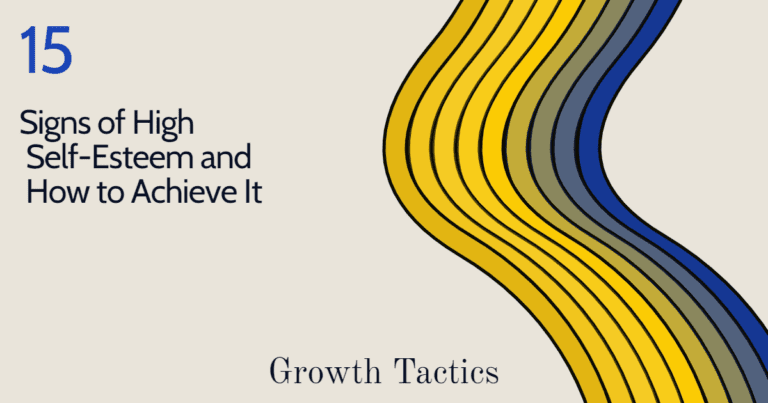Do you ever marvel at individuals who seem to radiate confidence and resilience? Those who effortlessly traverse life’s challenges without losing their stride? It’s not just luck or genetics that blesses them with high self-esteem, it’s a skill that can be cultivated and improved upon. In this blog post, we’ll explore the signs of high self-esteem that indicate a strong sense of self-worth and provide practical tips on how to enhance your own.
Jump To Section
What Are the Signs of High Self-Esteem?
1. Feeling Comfortable in Your Own Skin
One of the most noticeable signs of high self-esteem is feeling at ease with yourself. You accept who you are and embrace your uniqueness, quirks and all. You understand that perfection is an illusion and appreciate your strengths and weaknesses.
2. Having a Positive Outlook on Life
People with high self-esteem approach life with optimism. They maintain a positive mindset, even in the face of adversity. They believe in their ability to overcome challenges and see setbacks as opportunities for growth.
Unleash your inner confidence, embrace your worth, and become unstoppable. 💪 Discover the signs of high self-esteem and learn how to achieve it here: #SelfEsteem #Confidence #BelieveInYourself
3. Learning from Failure
Those with high self-esteem understand that failure is a part of life. They don’t let it define them or limit their potential. Instead, they learn from their mistakes, find valuable lessons in every setback, and use them as stepping stones toward success.
4. Respecting Personal Boundaries
Individuals with high self-esteem prioritize their own well-being and set healthy boundaries. They understand the importance of saying “no” when necessary and respect their limits. They recognize that self-care is crucial for maintaining a strong sense of self-worth.
5. Assertiveness with Respect
Assertiveness is another sign of high self-esteem. Those who possess this trait are confident in expressing their thoughts, needs, and desires while respecting the rights and boundaries of others. They navigate social interactions with grace and clarity.
6. Handling Criticism with Resilience
Instead of allowing criticism to crush their spirits, individuals with high self-esteem use it as an opportunity for growth. They view feedback as valuable input and separate constructive criticism from personal attacks. They maintain composure and respond in a composed and eager-to-learn manner.

7. Confidence in the Face of Challenges
People with high self-esteem embrace challenges and view them as opportunities to prove their capabilities. They trust their abilities and have confidence in their problem-solving skills. Challenges don’t intimidate them; they tackle them head-on.
8. Seeking Personal Development
Individuals with high self-esteem have a deep desire for personal growth. They actively seek opportunities to learn new skills, expand their knowledge, and develop their strengths. Lifelong learning is a priority for them.
9. Setting and Achieving Realistic Goals
Those with high self-esteem set ambitious yet achievable goals. They have a clear understanding of their strengths and limitations, allowing them to set targets that challenge and motivate them. They celebrate each milestone, no matter how small.
10. Maintaining Healthy Relationships
People with high self-esteem consciously surround themselves with positive, supportive individuals. They have healthy boundaries within relationships, communicate effectively, and foster connections that uplift and inspire them.
11. Embracing Individuality and Uniqueness
Individuals with high self-esteem celebrate their individuality and uniqueness. They embrace their differences, recognizing that it is what sets them apart and makes them remarkable. They resist the urge to conform and confidently express their authentic selves.

12. Empathy and Compassion Towards Others
Those with high self-esteem not only value themselves but also demonstrate empathy and compassion towards others. They recognize that everyone is on their own journey and extend understanding and support to those around them.
13. Prioritizing Self-Care Practices
People with high self-esteem prioritize self-care as a means to maintain their well-being. They understand the importance of nurturing their physical, mental, and emotional health. They carve out time for activities that bring them joy, relaxation, and rejuvenation.
14. Seeking and Accepting Help
Individuals with high self-esteem recognize that seeking help is a sign of strength, not weakness. They are open to the guidance and support of others and understand that collaboration and synergy can lead to greater success.
15. Celebrating Personal Achievements
People with high self-esteem take the time to acknowledge and celebrate their personal achievements, no matter how small. They understand that each milestone reached brings them closer to their goals and boosts their self-confidence.
What Causes Low Self-Esteem?
Low self-esteem affects millions of people, hindering their happiness, success, and overall well-being. But what causes this negative self-perception? Understanding the contributing factors is the first step towards overcoming them and embracing a more positive self-image.
1. Negative Experiences and Childhood Influences
Our experiences in childhood lay the foundation for our sense of self. The dynamics within our families, interactions with peers, and even traumatic events can significantly impact our self-esteem. If you grew up in an environment where criticism, neglect, or abuse were commonplace, it’s no wonder that your self-perception has suffered.

2. Comparison and Social Media
In today’s era of constant social comparison, it’s easy for our self-esteem to take a hit. Social media platforms bombard us with carefully curated moments of others’ lives, creating unrealistic expectations and fostering feelings of inadequacy.
3. Internal Critic and Negative Self-Talk
Perhaps one of the most destructive contributors to low self-esteem is our internal critic. This relentless voice in our heads constantly berates us, highlighting our flaws and highlighting every mistake we make.
4. Perfectionism and Unrealistic Expectations
Do you set impossibly high standards for yourself? Do you believe that anything short of perfection is a failure? If so, perfectionism may be contributing to your low self-esteem.
5. Surroundings and Support System
Your environment and the people you surround yourself with greatly influence your self-esteem. Toxic relationships and negative influences can chip away at your sense of worth and leave you feeling drained and defeated.
The Path to Improved Self-Esteem
Now that we’ve explored the signs of high self-esteem, it’s time to focus on techniques for improving your own sense of self-worth:
1. Identifying and Challenging Negative Self-Talk
Learn to recognize negative self-talk and challenge it with positive, affirming statements. Reframe your inner dialogue to focus on self-encouragement and empowerment.
2. Building and Maintaining a Support System
Surround yourself with individuals who uplift and support you. Cultivating a diverse network of positive influences will provide emotional support and motivation on your journey towards high self-esteem.
3. Practicing Self-Compassion and Self-Acceptance
Treat yourself with the same kindness and understanding that you extend to others. Accept your imperfections and embrace self-compassion, recognizing that everyone makes mistakes and deserves forgiveness.
4. Setting Realistic and Achievable Goals
Break down your aspirations into smaller, attainable goals. Celebrate each accomplishment along the way, boosting your self-esteem and fueling your motivation to reach even higher.
5. Engaging in Fulfilling Activities
Make time for activities that bring you joy and fulfillment. Pursue hobbies, explore new interests, and indulge in activities that ignite your passion. Embracing these moments of pure enjoyment will nourish your self-esteem.
6. Cultivating Gratitude and Positive Thinking
Adopt a mindset of gratitude and regularly reflect on the things you are thankful for in your life. Foster positive thinking by focusing on your achievements, strengths, and the positive aspects of every situation.
7. Seeking Professional Help, if Necessary
If you find that your self-esteem is persistently low despite your efforts, consider seeking guidance from a qualified professional. Therapists and coaches can offer valuable insights and techniques to help you build a healthier self-image.
8. Embracing Self-Care and Prioritizing Mental Health
Recognize the importance of self-care as an investment in your overall well-being. Prioritize activities that promote mental and emotional health, such as exercise, healthy eating, meditation, and relaxation.

9. Stepping Out of Your Comfort Zone
Growth occurs when you challenge yourself. Embrace new experiences and venture beyond your comfort zone. Each new endeavor will strengthen your self-confidence and expand your horizons.
10. Practicing Mindfulness and Self-Reflection
Take time to practice mindfulness and self-reflection. Pause, explore your thoughts and emotions, and gain clarity about your values and aspirations. This introspection facilitates personal growth and enhances your self-esteem.
11. Celebrating Small Wins and Personal Milestones
Don’t dismiss your achievements, no matter how trivial they may seem. Celebrate each step forward and recognize the progress you’ve made. This positive reinforcement fuels further growth and boosts self-esteem.
12. Avoiding Comparison to Others
Comparing yourself to others is a detriment to your self-esteem. Focus on your unique journey and celebrate your own successes. Remember, you are running your own race.
13. Learning to Assertively Communicate Needs and Boundaries
Develop assertiveness skills to communicate your needs and boundaries effectively. Advocate for yourself in a respectful manner, ensuring that your voice is heard and your limits respected.
In Conclusion
Recognizing and cultivating high self-esteem is a transformative journey. By embracing your uniqueness, nurturing self-care practices, setting realistic goals, and cultivating positive thinking, you can unlock your inner confidence. Remember, you are worthy of love, respect, and success. Nurture your self-esteem, and watch yourself soar to new heights.


